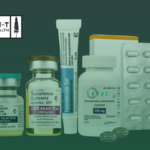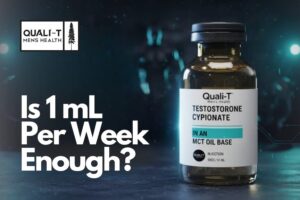
One of the most common concerns men have when considering testosterone replacement therapy (TRT) is if they have to stay on TRT forever.
“If I start TRT, does that mean I have to stay on it for life?”
The honest answer?
Not necessarily. At Quali-T Men’s Health, we want you to have all the facts before you start any treatment—and that includes knowing what happens if you decide to stop TRT.
What Happens to Natural Testosterone Production on TRT?
Testosterone replacement therapy works by supplementing your body’s testosterone levels, which in turn suppresses your own natural testosterone production. This suppression is part of the normal feedback loop known as the hypothalamic-pituitary-gonadal (HPG) axis.
When exogenous (outside) testosterone is introduced into the body, your brain senses that testosterone levels are sufficient and reduces the signal to your testicles to produce more. This can lead to a temporary shutdown or decrease in natural testosterone production.
But here’s the good news: This process is generally reversible.
Can Natural Testosterone Production Restart After TRT?
Yes—most men are able to restart their natural testosterone production after stopping TRT. They are more likely to regain endogenous production if:
- They’ve been on TRT for a short to moderate period of time.
- They had some natural production to begin with.
- They use post-TRT therapies to stimulate recovery.
A 2009 study published in Fertility and Sterility found that most men who discontinued TRT after short-term use recovered natural testosterone production within 3–6 months—some as early as 4–6 weeks (Coviello et al., 2005).
In more recent clinical practice, medications like hCG (human chorionic gonadotropin) are often used to help stimulate the HPG axis and restore natural hormone balance after stopping TRT. This can shorten the time it takes to restart your natural production of testosterone.
Why Most Men Stay on TRT Long-Term?
While it’s possible to come off TRT, the majority of men choose to stay on long-term because:
- They feel significantly better on TRT.
- There are long term benefits of TRT including, but not limited to: muscle health, bone health, brain health, heart health, improved cholesterol (lipids), improved glycemic control (blood sugar), improved erections, improved sex drive, improved overall mood, improvement in foggy thinking, etc.
- They are okay with the trade-off of maintaining optimized levels vs. going back to how they felt pre-TRT.
Just like some people stay on blood pressure or thyroid medication for life, TRT can be a long-term therapy—but only if it makes sense for your life and health goals.
We Offer Options—Not Pressure
At Quali-T Men’s Health, we never force a one-size-fits-all plan and tailor our plan as time goes on to fully dial in your protocol. Whatever your goal is, we’ll support it with honest, evidence-based guidance and full transparency.
How We Help You Come Off TRT Safely
If you decide to stop TRT, we may use a post-cycle therapy (PCT) protocol to help stimulate your own testosterone production again. This might include:
- We do not recommend Clomiphene Citrate. The risks simply don’t outweigh the risks.
- hCG: Mimics LH to promote testosterone and sperm production
- Time and monitoring: In most cases, your body can naturally reboot without medication
Every patient is different, and we’ll monitor your labs, symptoms, and recovery carefully throughout the process.
TRT Is a Tool—Not a Life Sentence
Starting TRT does not mean you’re committing for life. It’s a medical therapy that should be evaluated regularly based on how you feel, how your labs look, and what your life goals are.
At Quali-T Men’s Health, we specialize in giving men options—not locking them into permanent treatment. Whether you’re just getting started or considering a break, we’re here to guide you with respect, education, and clinical expertise.
Ready to learn more or ask questions about starting—or stopping—TRT? Visit us in Salem or Eugene, Oregon, or schedule a free consultation today.
Call or text—we’re just one call away (971) 240-3451
Citations:
- Coviello, A. D., et al. (2005). “Recovery of endogenous testosterone production after short-term testosterone enanthate administration in normal men.” Journal of Clinical Endocrinology & Metabolism, 90(1), 150–156. https://pubmed.ncbi.nlm.nih.gov/15713706/
- Patel, A. S., et al. (2019). “Testosterone Replacement Therapy in the Aging Male: Evidence-Based Patient Selection and Follow-Up.” The Journal of Sexual Medicine, 16(6), 812–822.





